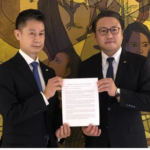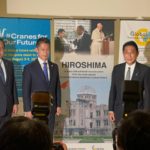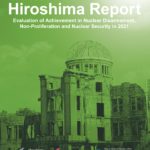Column 4 It’s Time to Review the Review Process
Nobumasa Akiyama
The COVID-19 pandemic has led to twice postponements of the 2020 Nuclear Non-Proliferation Treaty (NPT) Review Conference (RevCon). However, the postponements of the NPT RevCon have also provided an opportunity to rethink the modality and role of the Review Process.
The environment surrounding the NPT RevCon is a severe one. The last RevCon in 2015 failed to agree on a final document due to disagreement and division over disarmament between nuclear-weapon states and non-nuclear-weapon states, and between Arab states and the United States over a zone free of weapons of mass destruction in the Middle East. In 2010, although a final document was agreed upon, the process of reaching a consensus has been difficult.
In 2020, the security environment, which is seen by some states as a precondition for promoting nuclear disarmament, deteriorated as the arms control regime between the U.S. and Russia came to the brink, the confrontation between the U.S. and China worsened, and the major powers reduced their commitment to multilateral diplomacy. At the same time, the number of countries that have ratified the Treaty on the Prohibition of Nuclear Weapons (TPNW) has surpassed the 50 required for its entry into force, and momentum toward nuclear disarmament has grown among the countries promoting the treaty. Amidst this polarization of the international community over nuclear disarmament, there was a shared prospect in the NPT community that it would be difficult for the States Parties to agree on a final document at the 2020 RevCon. The pursuit of a political consensus affirming the importance of the NPT in maintaining its role as a cornerstone of the international non-proliferation regime was therefore set as a minimum goal.
However, even if the importance of the NPT is reaffirmed at the political level, it does not mean that the role of the RevCon has been completely fulfilled. If conflicts and disagreements remain unresolved and the RevCon is unable to agree on an effective final document, the significance of the RevCon and the fiveyear Review Cycle will be called into question.
If the RevCon and its Preparatory Committees remain merely a forum for states and groups to make their case alone, and if it becomes impossible to reach an agreement that would encourage states to take action in ways that would contribute to the promotion of the values of non-proliferation, disarmament and the peaceful use of nuclear energy that the Treaty provides, then states will choose forums such as meetings of States Parties to the TPNW and other events where they can better make their case. If this comes to pass, it may contribute to the decline of multilateralism in the field of nuclear disarmament, as well as that of nonproliferation that seeks the best solution for the international community through dialogue among those with different positions. This would be a major hindrance not only to nuclear disarmament, but also to the promotion of nuclear non-proliferation and nuclear security.
Neither nuclear disarmament nor nuclear non-proliferation can be achieved by unilateral claims or political pressure. It is necessary from the point of view of both effectiveness and sustainability that differences of opinion and position be reconciled, and that policies be pursued on the basis of consensus among the key interested countries. In order to discuss, implement, and ensure the implementation of effective and sustainable policies toward achieving the goal of the NPT, it is essential that the NPT Review Process—which has a high degree of universality and involves both states that possess nuclear weapons (if not all of them) and states that support the TPNW—properly functions.
In the current five-year review cycle with a RevCon and the three Preparatory Committee meetings, too much time is spent on one-sided statements by states parties, and there is little opportunity for candid, constructive, and solutionoriented discussions of the issues of real concern to states with regard to achieving the objectives of the NPT and their solutions.
Of course, institutional change is never easy. However, rather than focusing on a precise “reviewing the operation of the treaty”, it would be better to identify the concerns shared by countries—such as changes in the international environment and points of divergence or conflict, which are essential for achieving the objectives of the NPT—to identify issues and establish common ground for discussion. The time has come for the conference to be managed in such a way that it can facilitate discussion of these issues and find a way to resolve them.
Nobumasa Akiyama: Professor, Hitotsubashi University








